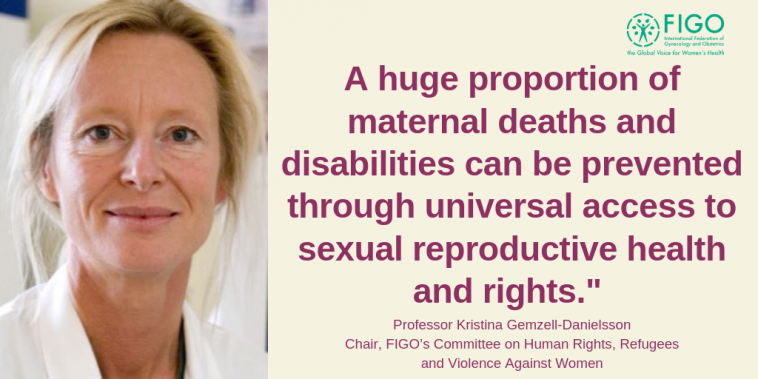Maternal rights in a humanitarian crisis

I love the famous and frequently cited words by former President of FIGO and Professor of Obstetrics and Gynaecology, Professor Mahmoud Fathallah:
"Women are not dying because of diseases we cannot treat. They are dying because societies have yet to make the decision that their lives are worth saving.”
As chair of FIGO’s Committee on Human Rights, Refugees and Violence Against Women, I feel strongly that these words are still too true.
Poor access to sexual and reproductive health services, stigma, violence against women and persistent ignoring of women’s rights are key contributors to maternal mortality and morbidity, as demonstrated in The Lancet’s 2016 maternal health series.
While there is no single cause, a key intervention to address this huge medical and social problem is sexual and reproductive health (SRHR). A huge proportion of maternal deaths and disabilities can be prevented through SRHR services, and ensuring universal access, alongside the integration of reproductive health into national strategies and programmes, is target 3.7 of the Sustainable Development Goals. If universal health coverage does not address women’s specific healthcare needs, then ‘health for all’ will have failed.
I intend to continue the important work initiated by the previous committees and working groups, which has led to such key activities as FIGO’s 2018 march and Global Declaration on Violence Against Women.
Sweden: the state of maternal health and rights
SRHR are key to the building of sustainable societies. The issue is high on the agenda in Sweden where I work, among professional organizations, in society and at government, but we still face many challenges ensuring maternal health and rights.
The Swedish Society of Obstetrics and Gynecology (SFOG) works in collaboration with our colleagues in science to combat the forces that try to restrict regulations regarding abortion. Our aim is to improve contraceptive counseling and provision, and to ensure high quality, comprehensive and evidence-based abortion care without stigma.
Sweden is geographically-challenging, and as in many countries around the world, quality of care can suffer across urban and rural settings. We have one of the highest fertility rates in Europe, although it is still below replenishment levels and we strive to ensure equal access to quality care.
This means keeping the rate of C-section down to levels that are purely about need; offering structured prevention, diagnostics, treatment and follow up for postpartum women, including for vaginal and perineal tears to prevent pelvic floor dysfunction, and preventing complications in pregnancy such as obesity, which can also have a long-term impact on maternal and child health.
Obstetricians and midwives work in a task-sharing model, as midwives take care of healthy women, and gynecologists care for women with medical conditions. This allows for optimal allocation of health care resources and encourages teamwork towards our shared goal: a safe delivery for mother and child.
Humanitarian crisis: the impact on maternal health and rights
During any form of humanitarian crisis, pre-existing patterns of discrimination and sexual violence against women and girls are aggravated. This results in increased risk of unwanted pregnancies and unsafe abortions. Assistance in the form of funding and human resources is crucial, and it is currently woefully insufficient: around 500 women and girls die every day in humanitarian settings due to pregnancy and childbirth related complications, accounting for 60 percent of all maternal deaths worldwide.
Although there has been a growth in the institutional capacity for SRHR in humanitarian settings, safe abortion services - including post abortion care, contraception counselling and provision – are seldom provided. The same is true for access to postpartum contraception.
In-depth knowledge of SRHR provision – access to it, experience of it, and attitudes towards it – is crucial in the work towards equal access to sexual and reproductive health, and humanitarian settings are no different. FIGO and our 132 member societies, representing Obstetricians and Gynecologists around the world, have a key role to play in working together with NGOs and others stakeholders.
Since 1990, we have seen a 45 percent decline in preventable maternal death, but two thirds of all maternal deaths now occur in sub-Saharan Africa, where the maternal mortality ratio was 546 deaths per 100,000 live births in 2015. Major efforts are needed to bring the maternal mortality ratio under 70 deaths per 100,000 live births by 2030, as prescribed by the 2030 Agenda for Sustainable Development, which FIGO is closely aligned to.
By speaking out, advocating and improving quality of care education and training of healthcare providers we can empower women to make decisions about their own reproductive health, and collectively ensure their fundamental human right.